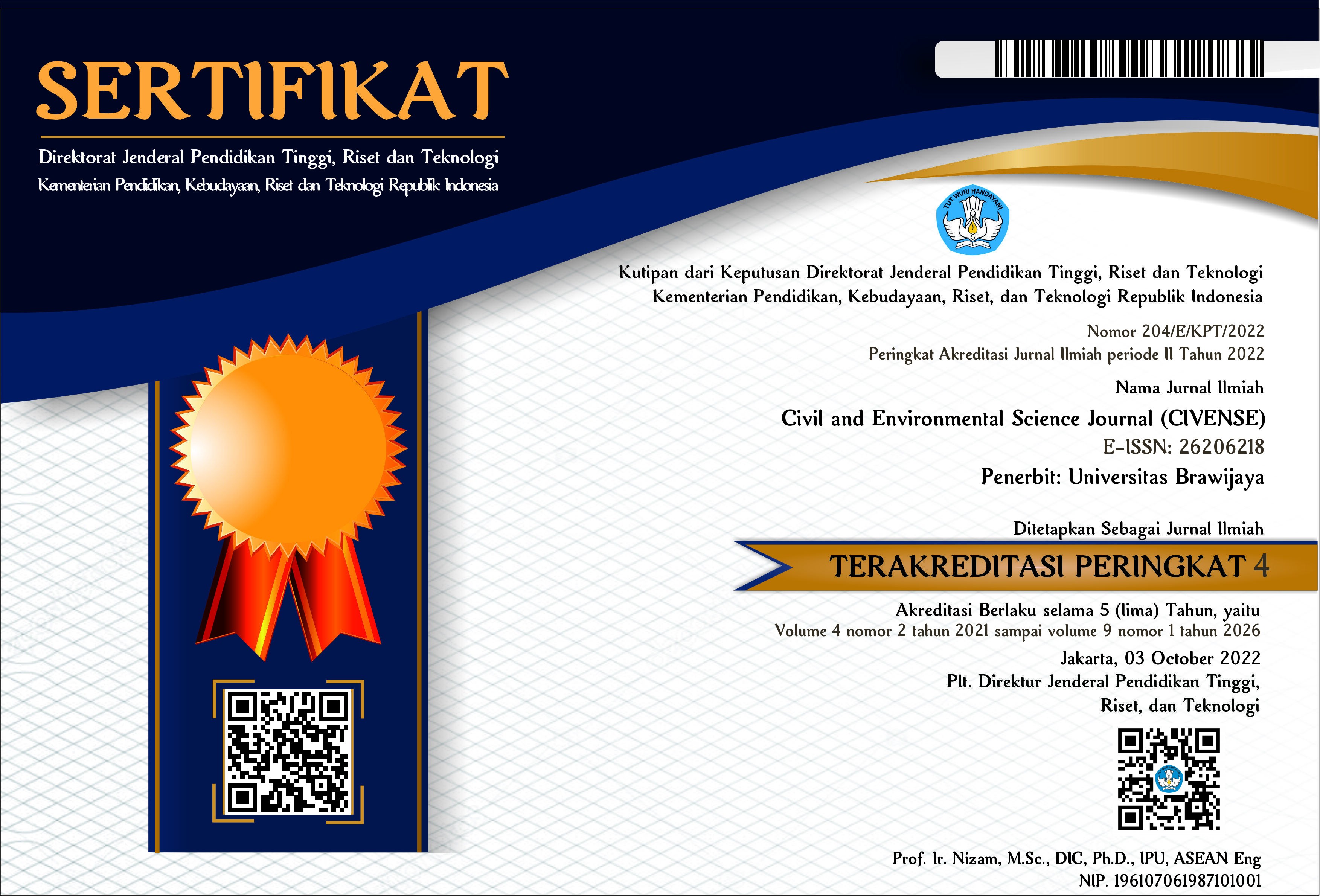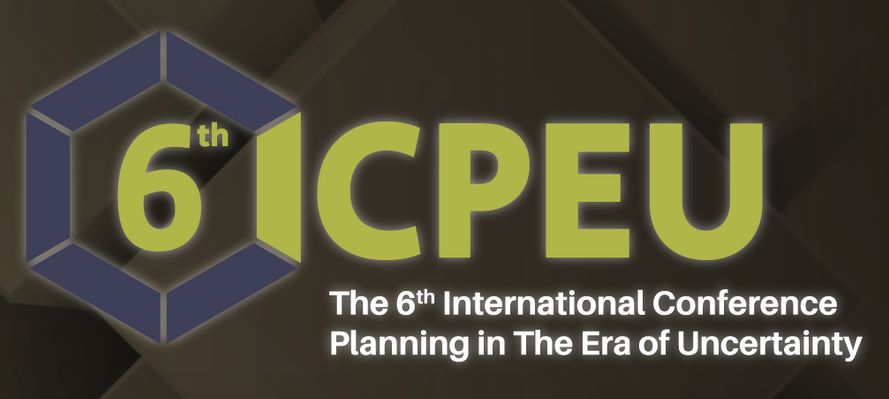Development Zoning of Bindu River Ecotourism based on Eco Culture
DOI:
https://doi.org/10.21776/ub.civense.2021.00402.8Keywords:
zoning, river ecotourism, sustainable development, eco culture.Abstract
Bindu River Ecotourism is a tourist attraction that has natural potential as a place of recreation in the Denpasar City area. Apart from the potential offered by Bindu River Ecotourism, there are still problems that exist in Bindu River Ecotourism including river water which has a lot of sediment, the lack of public awareness to care about the surrounding environment, and the lack of exposure by the public makes only the surrounding community aware of it. If zoning is not carried out in its development, the natural potential of the Bindu River Ecotourism area that has been arranged can be reduced, for this reason, zoning is needed in its development to determine areas in the Bindu River Ecotourism area that are in accordance with the land use and development potential. Based on the delineation and the existing potential, the Bindu River Ecotourism area is divided into a conservation zone and a recreation zone. For the conservation zone, it can be developed into several more zones in the upstream part, it can be developed into a zone for the development of the function of protecting water resources, a zone for the development of the function of protecting flora and fauna as well as limited recreational functions. While the recreation zone can also be developed into several more zones. The upstream recreation zone can be developed into a recreation function development zone and the downstream recreation zone can be developed into an educational function development zone.
References
D. Widodo, B. Lupiyanto, R., dan Wijaya, “Pengelolaan Kawasan Sungai Code Berbasis Masyarakat,” J. Sains dan Teknol. Lingkung., vol. 2, no. 1, 2010.
D. S. Ida Ayu Made and Luh Putu Kirana Pratiwi, “Strategy For Ecotourism Development In Efforts To Improve Community Welfare In Ayung River Flow (Case Study of Bindu River Ecotourism, Kesiman Village, Denpasar City),” SEAS (Sustainable Environ. Agric. Sci., vol. 5, no. 1, pp. 1–6, 2021, doi: 10.22225/seas.5.1.3143.1-6.
H. Hartoyo and U. Supardi, Membedah Pengelolaan Administrasi PBB dan BPHTB. Jakarta: Mitra Wacana Media, 2010.
C. Birawa and R. M. Sukarna, “Zonasi Ekowisata Kawasan Konservasi Pesisir di Kecamatan Katingan Kuala, Kabupaten Katingan, Provinsi Kalimantan Tengah Melalui Pendekatan Ekologi Bentang Lahan,” J. Ilmu Kehutan., vol. 10, no. 19–32, 2016.
H. Aliani, S. Babaie Kafaky, A. Saffari, and S. M. Monavari, “Land evaluation for ecotourism development—an integrated approach based on FUZZY, WLC, and ANP methods,” Int. J. Environ. Sci. Technol., vol. 14, no. 9, pp. 1999–2008, 2017, doi: 10.1007/s13762-017-1291-5.
F. Hajizadeh, M. Poshidehro, and E. Yousefi, “Scenario-based capability evaluation of ecotourism development–an integrated approach based on WLC, and FUZZY–OWA methods,” Asia Pacific J. Tour. Res., vol. 25, no. 6, pp. 627–640, 2020, doi: 10.1080/10941665.2020.1752752.
Suparno, “Zonasi wilayah pesisir dan pulau kecil sebagai salah satu dokumen penting untuk disusun Pemerintah Daerah Provinsi/Kabupaten/Kota,” J. Mangrove dan Pesisir, vol. 11, no. 1, pp. 1–8, 2009.
Suardi, “Problematika Penerapan Prinsip Sustainable Development dalam Pengelolaan Lingkungan Hidup dan Implikasinya Terhadap Pemenuhan HAM,” J. Ilmu Huk., vol. 8, no. 4, pp. 614–628, 2014.
D. Astanin, “Functional zoning of ecological tourism areas by degree of regulation of building and planning activities,” E3S Web Conf., vol. 138, 2019, doi: 10.1051/e3sconf/201913801013.
S. R. Sutcliffe and M. L. Barnes, “The role of shark ecotourism in conservation behaviour: Evidence from Hawaii,” Mar. Policy, vol. 97, no. August, pp. 27–33, 2018, doi: 10.1016/j.marpol.2018.08.022.
P. A. Quezada-Sarmiento, J. del C. Macas-Romero, C. Roman, and J. C. Martin, “A body of knowledge representation model of ecotourism products in southeastern Ecuador,” Heliyon, vol. 4, no. 12, 2018, doi: 10.1016/j.heliyon.2018.e01063.
S. Snyman, “The role of private sector ecotourism in local socio-economic development in southern Africa,” J. Ecotourism, vol. 16, no. 3, pp. 247–268, 2017, doi: 10.1080/14724049.2016.1226318.
Downloads
Published
How to Cite
Issue
Section
License
Copyright (c) 2021 I Gusti Agung Putu Eryani, I Nyoman Nuri Arthana, Ni Made Ayu Gemuh Rasa Astiti

This work is licensed under a Creative Commons Attribution-NonCommercial 4.0 International License.
Authors who publish with this journal agree to the following terms:
Authors retain copyright and grant the journal right of first publication with the work simultaneously licensed under a Attribution-NonCommercial 4.0 International License that allows others to share the work with an acknowledgement of the work's authorship and initial publication in this journal.
Authors are able to enter into separate, additional contractual arrangements for the non-exclusive distribution of the journal's published version of the work (e.g., post it to an institutional repository or publish it in a book), with an acknowledgement of its initial publication in this journal.
Authors are permitted and encouraged to post their work online (e.g., in institutional repositories or on their website) prior to and during the submission process, as it can lead to productive exchanges, as well as earlier and greater citation of published work (See the Effect of Open Access).














